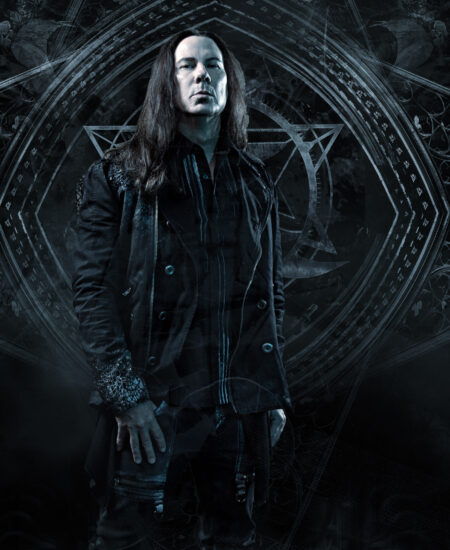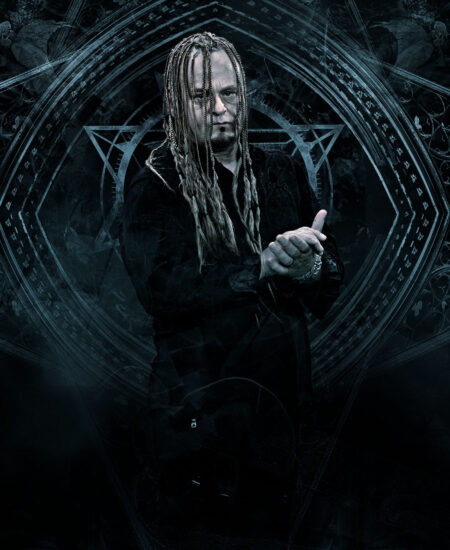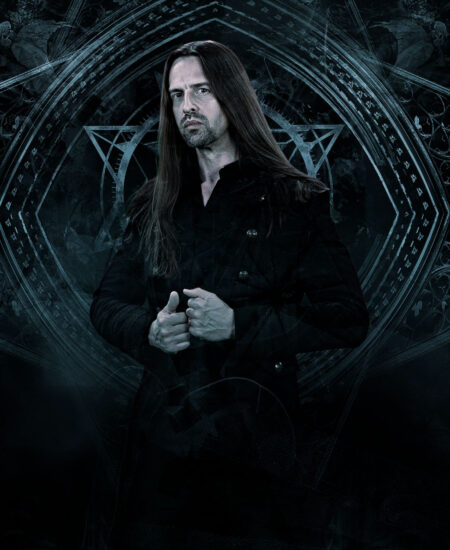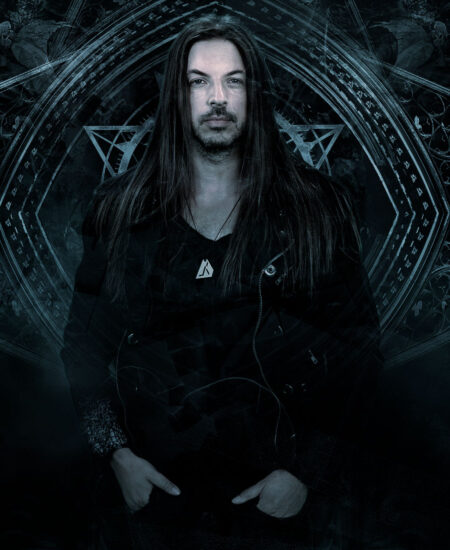Band

The Awakening
Tracks honoring KAMELOT trademarks like cinematic “The Great Divide” and darkly hopeful eternal farewell to a loved one, “Eventide”, prove that while The Awakening stays true to the aural foundations fans have embraced for decades, equally-addictive outputs like “One More Flag in the Ground” – a radio-ready anthem about overcoming seemingly unbeatable illness and the mental challenges we all face, featuring additional vocal layers from JUNO Award winning musician and producer Brian Howes – showcase a band devoid of sonic stagnancy. Profound compositions are plentiful, like stage-ready, operatic “Opus of the Night (Ghost Requiem)”, which features a hair-raising dual solo from guitarist Thomas Youngblood and guest cellist Tina Guo, as well as epic, synth-laden “New Babylon”, elevated by the dynamic vocal attack of frontman Tommy Karevik and Ad Infinitum’s Melissa Bonny. Further balancing darkness with light, grooving, heartfelt “NightSky” and ode to conquering one’s adversities “My Pantheon (Forevermore)” boast some of the album’s heaviest moments and most complex guitar solos, while pensive hymns such as Celtic-infused “Midsummer’s Eve” and ebbing-and-flowing hymn of cherished memories “Willow” provide necessary balance to an album fittingly primed for spectacular performances to come.
History
One of the most innovative and prestigious bands in modern symphonic metal, heavy icons KAMELOT present their most introspective, uplifting, vital release to date – their first full-length in five years, 2023’s aptly titled The Awakening.
“The Power of One” – what does this mean to modern symphonic/gothic metal masters KAMELOT? Above all else, it means sticking to a singular vision from beginning to end, which is exactly what’s allowed the multinational quintet to become the leading force in their field for roughly 25 years.
On their 13th studio album, The Awakening, the band expressly invites listeners to discover “the power of one” within themselves as well. Exuding the impassioned songwriting, complex musicianship, and sophisticated production that’s always made KAMELOT a remarkable act, the LP offers a more diverse, uplifting, and introspective journey compared to bleaker predecessor The Shadow Theory. As such, The Awakening encourages its audience to, well, awaken not only to the grandeur of its genre(s), but to the greatness of life itself.
Formed by guitarist Thomas Youngblood in 1991, KAMELOT also includes bassist Sean Tibbetts, keyboardist Oliver Palotai, and vocalist Tommy Karevik. In addition, The Awakening is their first original recording with drummer Alex Landenburg, whom Youngblood praises as “extremely creative, cool, and positive,” adding: “The drums on this record are amazing, and he definitely brings invigorating energy and chemistry to what we do.”
Given their extensive history and renowned artistry—spread across two dozen studio LPs and two live records—it’s only right that the group has amassed so many fans and accolades over the last quarter-century.
Having reigned supreme with the release of internationally top-charting melodic metal pinnacles such as The Fourth Legacy (1999), The Black Halo (2005), Silverthorn (2012), Haven (2015, #1 US Hard Rock Albums), and most recently 2018’s acclaimed The Shadow Theory (#2 US Hard Music Albums), The Awakening enters the KAMELOT legacy as their most massive and diverse offering yet – mixing symphonic, gothic, melodic, progressive and power metal styles while yielding some of the heaviest tracks in the band’s history.
Understandably, The Awakening arrives with vast expectations, yet as always, KAMELOT unquestionably exceeded them. In fact, even the title represents the band’s commitment to (and message of) seizing every opportunity and appreciating every moment in a post-pandemic world. “Initially, it was about awakening our senses to what was really important because we all kind of got forced to stay home more and be more social with our family and friends. It’s about awakening from our slumber and welcoming the new world,” Youngblood ponders.
The Awakening tackles a wide-array of resonant and pertinent topics that virtually all listeners can relate to. From explorations of societal division (“New Babylon”) and parent-child relationships (“NightSky”) to declarations of unrelenting strength (“My Pantheon (Forevermore),” “The Looking Glass,” “The Great Divide”) and hopeful outlooks (“Midsummer’s Eve,” “Willow”), every track on The Awakening is as deeply contemplative as it is hugely entertaining.
That blend of freshness and familiarity also extends to the music, with The Awakening cleverly evoking some earlier styles amidst incorporating innovative approaches.
Youngblood aptly explains: “There’s some stuff that harkens back to what made The Fourth Legacy and The Black Halo so special. At the same time, we figured why not have some fun and write some modern metal material as well. Honestly, the record is packed with everything that KAMELOT fans like.”
Helping bring the band’s vision to life are longtime partner Sascha Paeth—who’s produced every studio LP since The Fourth Legacy—and returning The Shadow Theory collaborator Jacob Hansen (Volbeat) on mastering and mixing duties.
The quintet aren’t the only ones playing on the record, either, as they’re once again joined by a few superb guests. In particular, multifaceted Ad Infinitum singer Melissa Bonny elevates “New Babylon,” just as violinist Florian Janoske and Grammy-nominated cellist Tina Guo beautify “Midsummer’s Eve.” There’s also added vocal layers from JUNO Award-winning producer Brian Howes on “One More Flag in the Ground,” not to mention “a whole variety of people in the choir parts, too,” Youngblood specifies.
“We met Melissa years ago, at first at some KAMELOT shows, and later I saw her doing a KAMELOT cover on YouTube,” Youngblood reveals. “She absolutely crushes her parts here, as does everyone else. We always look for new talent to feature and/or ways to cross collaborations off of the bucket list, and I’m so happy we were able to do that with The Awakening.”
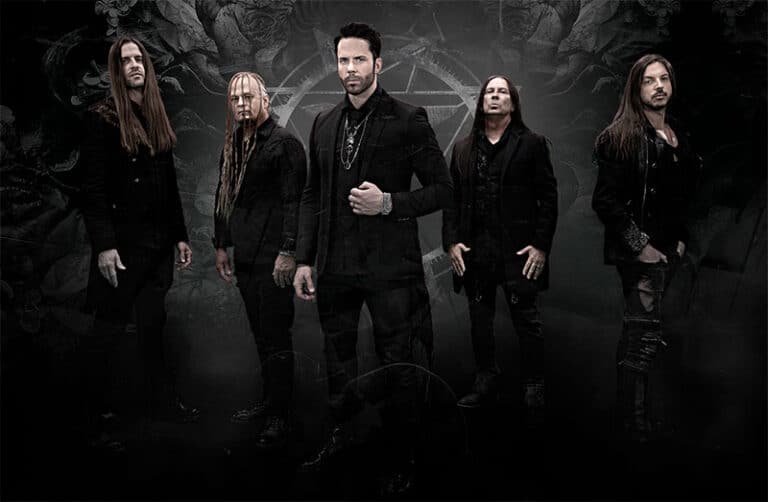
While the COVID-19 pandemic certainly made it difficult for other groups to produce new work, that wasn’t really the case for KAMELOT, because they’re used to writing, recording, and refining in separate places.
“It was definitely way more remote than in the past, but we’re spread out all over the world anyway, so it’s not like we can drive down the road to hang out. This time, we recorded in five different studios, including ones in Florida, Germany, and Canada. Plus, a lot of the initial songwriting was done at the start of 2020, before COVID, and there’s new software now that allowed us to go over the mix with Jacob in real time. I do miss the old ways of getting at least partially together, though, but I’m sure we’ll get back to that with the next album,” Youngblood reflects.
The Awakening could be described as a complex process, but followers both old and new will undoubtedly find it to be the band’s finest outing to date. For instance—and in keeping with tradition—it’s bookended by two gorgeously affective instrumentals (“Overture” and “Ephemera,” respectively) that embody KAMELOT’s beloved knack for theatrical continuity.
Youngblood expounds: “We try to frame records like stories or movies, with an opening soundtrack and closing credits. We still write records for fans who want to listen to a full piece of music from beginning to end, but people who don’t want that will still get a whole bunch of great individual songs to hear.”
To his point, the LP houses KAMELOT’s most varied, daring, and satisfying array of material in-between, too.
For example, there’s the Middle Eastern-tinged self-empowerment of radio-friendly lead single “One More Flag in the Ground,” as well as the modernized edge of “NightSky,” the idyllic nostalgia of “Willow,” the prog metal splendor of “The Looking Glass,” and the symphonic pensiveness of “Midsummer’s Eve.” At the same time, pieces such as the darkly thunderous “Eventide,” the feistily cinematic “The Great Divide,” the malevolently orchestral “New Babylon,” and the robustly dynamic “My Pantheon (Forevermore)” conjure classic KAMELOT, plain and simple.
On that note, there’s even a continuation of an earlier KAMELOT gem via the touchingly dramatic “Opus of the Night (Ghost Requiem).”
“The title track of 2007’s Ghost Opera was about a girl whose dream was to sing in front of the opera, but on the way to her debut, she’s assaulted. So, she never makes it there. Now, we’re seeing her granddaughter fulfill that dream and find resolution and catharsis,” Youngblood describes.
“The music of KAMELOT has always carried the message of hope, light and a feeling of resolution. This story is a prime example of that. ‘Opus of the Night (Ghost Requiem)’ honors the traditional dark and melodic sound of the band while bringing some new and exciting elements to the table,” adds vocalist Tommy Karevik.
Naturally, such compelling compositions require equally fascinating visuals, which is where Greek artist Giannis Nakos comes in. “It’s our first time working with him,” says Youngblood, “and he did a fantastic job. The artwork and the booklet and the Earbook are incredible.” Indeed, Nakos’ designs perfectly complement the music they represent.
Fittingly, The Awakening will also see KAMELOT embark on the biggest tour in their history, starting with a European run in the spring of 2023 and then carrying over to North America the fall. “We’re coming off of our biggest concert and DVD shoot to date [2020’s I Am the Empire – Live from the 013], but we’re certainly not resting on our laurels. We want to get out there and showcase The Awakening for as many people as possible,” Youngblood rejoices.
As they should. From beginning to end, The Awakening finds KAMELOT at their most poised, imaginative, and empathetic, matching heartfelt storytelling and personal convictions with characteristically adventurous yet gratifying instrumentation. In that way, it’s an essential reflection on where they—and us—have been, as well as a hopeful plea for where we all should be headed.
Jordan Blum – January 2023


